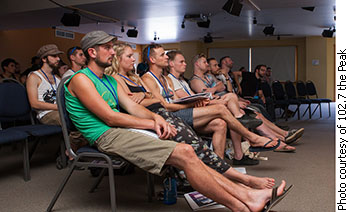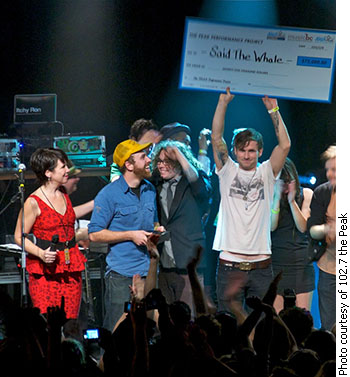Tags
Related Posts
Share This
The Peak Performance Project: Lifting B.C. musicians to new heights
The past six months have been one wild ride for Daniel McBurnie.
Half a year ago, McBurnie might have imagined his Monday morning sitting in a freshman class at the University of Victoria. In an hour or two, he would get together with the other members of Good for Grapes for band practice. Later in the week, Good for Grapes might have been playing a small show for nothing more than the price of a few pints, out of love the music rather than for any financial gain.
That life, however, was left behind the moment McBurnie and Good for Grapes were announced as one of the top 20 finalists in the annual Peak Performance Project in June 2013. Since then, McBurnie’s life has been a whirlwind: learning from industry experts, developing a merchandising plan, playing a huge concert series and embarking on a cross-country sprint tour that took him from Vancouver to Toronto and back again.

Good for Grapes: guitarist Graham Gomez, accordionist Sean MacKeigan (who left the band in December), keyboardist Alexa Unwin, lead vocalist Daniel McBurnie, bassist Robert Hardie and drummer Blair Hansen.
As it turned out, Good for Grapes was unable to claim the Peak Performance contest top prize, but they did finish fourth overall and walked away with $10,000 cash to put toward their musical careers. More importantly according to McBurnie, the members of Good for Grapes, six 18- and 19-year-olds, came away from the contest knowing they “had found their calling in the music business.”
The ‘formula for success’
The Peak Performance Project started five years ago as a joint venture between MusicBC and the Jim Pattison Group, owners of 102.7 the Peak, an adult-alternative radio station based in Vancouver. Together, the organizations pledged to invest more than five million dollars in the Vancouver independent music scene over seven years. This infusion was aimed at nurturing the careers of local musicians through intensive industry education and financial assistance. Each year, artist submissions are whittled down to a top 20, who then take part in an intensive “boot camp” designed to be a crash course in successful band management: 20 bands/artists are sent to the B.C. interior for a week to learn from industry experts about topics like marketing, showmanship, management and media training. Along the way, bands are challenged to come up with a charitable initiative, a marketing strategy, and a merchandising plan, all while perfecting their sound for a showcase series of concerts. Following a string of shows in Vancouver, the top-20 list is cut down to a final five, who then compete for a grand prize of over $100,000. While a fan vote accounts for part of the band’s score, a panel of judges determine the final placements.
‘If we hadn’t been in the Peak Performance Project, I might be at in Victoria studying law right now.’ — Daniel McBurnie

Getting groomed. At a Peak Performance Project makeshift summer camp, finalists attend workshops on marketing, management, etc.
The Peak’s “formula for success” borrows heavily from a similar annual competition run by a Newcap radio station in Ottawa. Despite the early success of Live 88.5’s “Big Money Shot”, Newcap’s initial commitment of three million dollars eventually ran dry, forcing the station to cut the prize pool by $240,000, to $10,000. The question for the Ottawa contest now is whether the format can still incubate local talent without offering a substantial cash incentive.
Tamara Stanners, Executive Director of the Peak Performance Project, won’t have to worry about that question until 2015, when the funding from the Jim Pattison Group ends. However, Stanners already is quick point out that a cash prize is just one of many benefits that involvement in the Peak Performance Project might bring for an aspiring artist. Exposure on a major commercial FM station, she argues, is almost unheard-of for unsigned local acts — except for Peak alumni. Each artist receives a good deal of promotion on the station, and the Peak’s live concert series usually sells out its venue.
Indeed, the showcase method has generated tangible results: In 2011, both Hollerado (winners of Ottawa’s Big Money Shot) and Said the Whale (Peak Performance Project alumni) were nominated for the Juno award for New Group of the Year. Said the Whale won, and have since released two albums, both to critical acclaim. In 2011, the band was also featured in a CBC documentary which followed the emerging Canadian act as they toured the United States (link here).

Said the Whale accepts second-place prize in the 2010 Peak Performance Project. The band would go on to win Best New Artist at the 2011 Junos.
While Stanners said she and her Peak colleagues loved watching Said the Whale’s meteoric rise, post–Peak Performance Project, she also enjoys the smaller success stories like Good for Grapes, who were fan favourites throughout the 2013 contest.
“They just got picked up by the biggest booking agency in Canada. Ralph James, the president of The Agency Group, picked them up without ever having seen them,” she said. “He was just blown away by the groundswell of support Good for Grapes got.”
To nurture young talent
The Peak will make its Alberta debut this year at a Calgary radio station, and the Jim Pattison Group, which owns the Peak, have already committed to funding an Alberta-based version. Meanwhile, the funding commitment for the Vancouver project will terminate in 2015. While Stanners said the plan is to continue the project thereafter, she admits that Vancouver’s Peak will have to find new sources of funding. Otherwise, the Peak will face the same fate as Ottawa’s Big Money Shot, and be forced to significantly scale back its prize money.
For McBurnie and Good for Grapes, the money was never the real prize. McBurnie said his real enthusiasm for the contest comes from his memories of bonding with fellow musicians, and learning the ropes of the industry from professionals themselves. The real value came from understanding that being a Vancouver-based musician was a viable career.
“We just turned 19 this year, so originally we had all planned to kind of split up and go our separate ways after school,” he said. “If we hadn’t been in the Peak Performance Project, I might be at in Victoria studying law right now.”
Instead, he’s fielding media requests from reporters, and touring across the country. Life of a rock star.
Home-page photo courtesy of Good for Grapes





